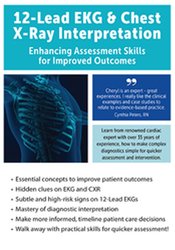Cheryl Herrmann – 12-Lead EKG & Chest X-Ray Interpretation
$219 Original price was: $219.$62Current price is: $62.
Shopping Instructions:
- DISCOUNT 15% : SHOP15
- Product Delivery: Within 1 – 12 hours after purchase.
You will also examine subtle and high-risk signs on 12-Lead EKG that are of concern preoperatively, in the ED, or in the clinic.
Cheryl Herrmann – 12-Lead EKG & Chest X-Ray Interpretation
PART I: THE ABCS OF 12-LEAD EKG INTERPRETATION
12-Lead EKG 101
- Cardiac electrical conduction system
- Electrical vectors
- Introduction to the 12-leads
- Limb leads
- Augmented leads
- Chest leads
- Introduction to the 12-leads
- Normal polarity and P-QRS-T configuration of each lead
Ace the Axis
- Left and right axis deviation
- Causes and criteria of axis deviation
- Methods to determine axis deviation
- Case presentations, analysis, and clinical application
Beat the Bundles
- Right and left bundle branch blocks (BBB)
- Criteria for right vs. left BBB
- Causes and complications of right and left BBB
- Left anterior and left posterior hemiblocks
- Case presentations, analysis, and clinical application
Correlate the Coronary Anatomy
- Coronary arteries
- Right coronary artery (RCA)
- Left coronary artery (LCA)
- Left anterior descending artery (LAD)
- Circumflex artery (CX)
- Posterior descending artery (PDA)
- Left ventricular walls
- Inferior
- Anterior
- Septal
- Lateral
- Posterior
- Relationship of coronary arteries and ventricular walls to the 12-leads
- Inferior—RCA—leads II, III, AVF
- Anterior/septal—LAD—leads V1–V4
- Lateral—circumflex—leads I, AVL, V5, V6
- Posterior—PDA—reciprocal changes V1–V4
Differential Diagnosis: 12-Lead EKG in Acute Coronary Syndrome
- Ischemia pattern
- Injury pattern
- Infarction pattern
- Reciprocal changes
- ST segment elevation myocardial infarction (STEMI)
- Non-ST segment elevation myocardial infarction (NSTEMI)
- Coronary spasm
- Takotsubo cardiomyopathy (broken heart syndrome)
Example and Analysis Time – Piecing It All Together
- 30-second diagnosis of STEMI on 12-lead EKG
- Coronary angiographic correlation to 12-lead EKG
- Case presentations, analysis, and clinical application
Advanced 12-Lead: Challenging Clinical Presentations
- Atrial and ventricular hypertrophy
- Wolff-Parkinson-White syndrome
- Prolonged QT intervals
PART II: CHEST X-RAY INTERPRETATION – AS EASY AS BLACK AND WHITE
Note: Most chest X-ray examples will be AP films
Chest X-ray basics
- Technique
- Black and white principles
- Projections
- Anterior-posterior (AP)
- Posterior-anterior (PA)
- Lateral
Systematic Approach
- Bone structures
- Intercostal spaces
- Soft tissues
- Lungs/trachea/pulmonary vasculature
- Pleural surfaces
- Diaphragm
- Mediastinum
- Heart and great vessels
- Invasive lines
As Easy as Black
- Pneumothorax
- Subcutaneous emphysema
- Clinical application and treatment
As Easy as White
- Pleural effusion
- Pulmonary edema
- Pneumonia
- Atelectasis
- Acute respiratory distress syndrome (ARDS)
- Cardiomyopathy
- Pericardial effusion
- Cardiac tamponade
- Clinical application and treatment
Beyond the Basics
- Aortic aneurysm
- Post-op changes with pneumonectomy
- Hydropneumothorax
- Esophagogastrectomy
- Dextrocardia
- Clinical application and treatment
PART III: CXR & 12 LEAD EKG CASE PRESENTATIONS, ANALYSIS, AND CLINICAL APPLICATION
Would you like to receive Cheryl Herrmann – 12-Lead EKG & Chest X-Ray Interpretation ?
Description:
When to be concerned — 12-Lead EKG Pearls of Wisdom
In a cardiac event, the clock starts ticking as soon as the coronary artery becomes occluded. Are you ready to rapidly interpret STEMI (ST segment elevation myocardial infarction) changes with a 12-lead EKG and provide effective intervention to reduce the size of the AMI? The 12-lead EKG is one of the most frequently utilized cardiac assessment tools to assess chest pain. Yet, it provides us with so much more information that can help improve patient care. The purpose of this portion of the recording is to assist the health care professional in mastering 12-lead EKG assessment skills in order to identify the common and not-so-common changes. You will also examine subtle and high-risk signs on 12-Lead EKG that are of concern preoperatively, in the ED, or in the clinic.
As Easy as Black and White…
Chest X-rays are also a commonly ordered diagnostic test, yet viewing and interpreting them can be challenging. Chest X-rays can be as simple as black and white. The purpose of this portion of the recording is to provide clinicians with chest X-ray interpretation skills in order to help you easily assess changes in the patient’s condition. You will develop skills in line identification; differentiations among atelectasis, pneumonia, ARDS, pleural effusion, and pulmonary edema; and identification of pneumothorax, cardiac tamponade, and cardiomyopathy. You will view examples of numerous chest X-rays to reinforce the concepts presented. Clinicians will walk away from this session with practical skills for better, quicker patient assessment allowing for more effective intervention.
Here’s What You’ll Get in Cheryl Herrmann – 12-Lead EKG & Chest X-Ray Interpretation
Cheryl Herrmann – 12-Lead EKG & Chest X-Ray Interpretation : Sample
Related products
HEALTH & MEDICAL
HEALTH & MEDICAL
Regina Meredith – Conscious Media Network with Regina Meredith – Eric Pearl on The Reconnection
HEALTH & MEDICAL
Gaia—Creating-High-Voltage-Health-with-Glenn-Streeter-Open-Minds
HEALTH & MEDICAL
HEALTH & MEDICAL
HEALTH & MEDICAL













